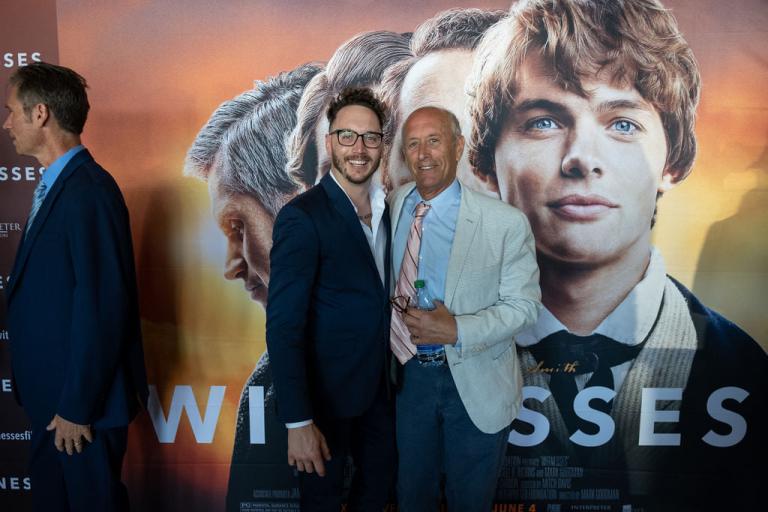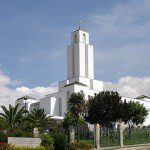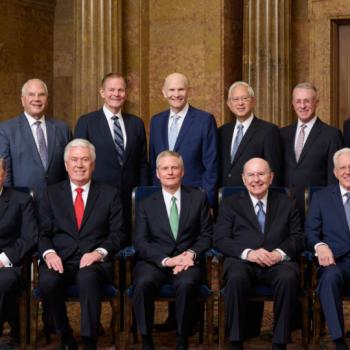
***
The premiere for the Interpreter Foundation’s Witnesses film went well last night, I think — except for a problem with the main theater’s projector with which our filmmakers had to struggle for about an hour. (The projector apparently hadn’t been functioning properly during its showings of Cruella last week, either.). It delayed things just a bit, and there were a couple of scenes in the movie in which things may have been slightly blurry. Whether anybody noticed that or not, I have no idea. Anyhow, the audiences in the various theaters were sizable — I’m told that there were more than a thousand people in attendance — and they seemed, as far as I could tell, to receive the film quite well and even enthusiastically.
Here’s a response to last night’s showing from a blogger calling herself or himself LDS365: “WITNESSES: New Movie About The Three Witnesses to The Book of Mormon”
We’re finally underway!

The movie will officially open in some theaters tonight, and tonight’s ticket sales will count toward figures for its official “opening weekend” — which are very important. Brandon Purdie, our distributor, tells me that he will be on the phone on Monday negotiating for screens again, and that a good opening weekend will significantly strengthen his negotiating position. (I’ve already signed a document just this morning that should make the film available in two more theaters, one of them, if I recall correctly, in Massachusetts and the other in Tennessee.)
The media and publicity campaign for Witnesses appears to be going reasonably well. For example, this sponsored item from Purdie Distribution has appeared on the KSL.com site:
“New movie about witnesses to the Book of Mormon shows a raw, human side to early Church leaders”
It’s a little difficult keeping up with the various interviews. For instance, I myself just pre-recorded one this morning with the “All In” podcast that belongs to Deseret Book and Excel Entertainment. I think that it will go public either next week or the week thereafter. And I’m scheduled to pre-record another for KSL-AM this evening.
I’ve already mentioned the two interviews done by Hanna Seariac for FAIR, one with me and one with Caleb Spivak (Oliver Cowdery) and Paul Wuthrich (Joseph Smith).
From B98.7/KBEE-FM, a non-LDS interviewer speaks with the film’s “Joseph Smith”:: “Check out my interview with Paul Wuthrich from he new movie Witnesses Film that opens this Friday. #witnessesfilm”
From Fox 13 [Television], with Lincoln Hoppe (“Martin Harris”): “New film tells the untold story of the three WITNESSES to the Book of Mormon”
I’m told that KSL-AM did interviews with Caleb Spivak (Oliver Cowdery) and Lincoln Hoppe (Martin Harris) during the 8 AM hour this morning, that ABC4 Midday did an interview with Caleb at about 12:30 PM, and that there will be a a Facebook Live interview tonight on Hi Five Live (57K Followers) with Lincoln Hoppe at 7 PM. When and if I have URLs for those, I’ll share them.
***
I published this column in the Deseret News back on 19 September 2013:
In 1841, rumors began to circulate that Martin Harris, one of the three Book of Mormon witnesses, had been murdered. The Mormons (who else?) had supposedly shot him to death. But, in fact, Martin Harris was perfectly healthy. He would live on until age 92, dying on July 10, 1875, in Clarkston, Utah. As Mark Twain later quipped after reading his own obituary, the report of Martin’s death was “an exaggeration.” He was now, the “Painesville Telegraph” wryly observed, “a living witness of what shall be said of him after his death.”
While still under the misapprehension that he had been killed, the Christian Mirror, published at Portland, Maine, printed an article by Alvah Strong about Martin Harris. Editor of the Rochester Daily Democrat, Strong had worked previously in Palmyra, N.Y., and had known Harris personally.
Strong was no admirer of Joseph Smith and Mormonism: “At that time,” he reminisced about Palmyra in the spring of 1828, “Jo. Smith had a mere handful of followers, most of whom were as destitute of character and intelligence as the ‘Prophet’ himself.” (By the time Strong was writing, the supposedly unintelligent Joseph Smith had founded a rapidly growing church and established a new and rapidly expanding city, Nauvoo, on the banks of the Mississippi River. Nevertheless, his name had become toxic in many circles, and condemning him was virtually mandatory in refined society.)
Unlike the poor family of Joseph Smith Sr. and Lucy Mack Smith, however, Martin Harris had been a respectable Palmyra citizen. And, unlike Joseph Smith Jr., he could be excused as an innocent dupe.
Prior to his affiliation with Joseph Smith and Mormonism, Harris was generally regarded as a good and honest man. A successful farmer in the area of Palmyra, he eventually owned and cultivated 320 acres of land. Alvah Strong remembered his farm as “one of the best in the town.”
He had served as an overseer of highways, a manager of the Ontario (County) Agriculture Society, and, in a period when aging veterans of the American Revolution still lived in many local communities, a member of the “revolutionaries’ relief committee.” The trust that his neighbors placed in him can be seen in the fact that he was also selected as a “Fence Viewer.” Tasked with monitoring property boundaries, such “Viewers” inspected new fences and dealt with the disputes that periodically arose when livestock escaped their enclosures and trespassed on the fields of others (perhaps trampling or consuming valuable crops).
If he ever read it, Martin Harris probably found Alvah Strong’s article quite interesting. At this distance in time, I certainly do, and, fortunately, BYU-Idaho’s Kyle Walker has published the article, with historical introduction, in the Mormon Historic Sites Foundation’s very useful semiannual journal, “Mormon Historical Studies.”
“We have ever regarded Mr. Harris as an honest man,” Strong wrote, referring also to Martin’s sturdy “native honesty.” “He had long sustained an irreproachable character for probity.” As Strong recalled him, Harris seemed to be sincere, and he had dedicated himself to the cause of Mormonism “even at the expense of his own pecuniary interests.”
There is a particularly rich historical portrayal in one of Alvah Strong’s sentences about Martin:
“By his neighbors and townsmen with whom he earnestly and almost incessantly labored, he was regarded rather as being deluded himself, than as wishing to delude others knowingly, but still he was subjected to many scoffs and rebukes, all of which he endured with meekness becoming a better cause.”
Strong couldn’t, of course, grant any truth or worthiness to Mormonism. But, along with most if not all of the other residents of Palmyra, he also couldn’t bring himself to pronounce Martin Harris a deceiver. Instead, Strong remembered Harris as a humble, hardworking and sincere man, deeply devoted, notwithstanding mockery and opposition, to what he genuinely believed to be true.
This is no insignificant fact: Martin Harris testified to the end of his life that, with David Whitmer and Oliver Cowdery, he had “seen the plates” and “the engravings which are upon the plates.” With Whitmer and Cowdery, he testified that the Book of Mormon had “been translated by the gift and power of God, for his voice hath declared it unto us.” “We declare with words of soberness, that an angel of God came down from heaven, and he brought and laid before our eyes, that we beheld and saw the plates, and the engravings thereon.”











